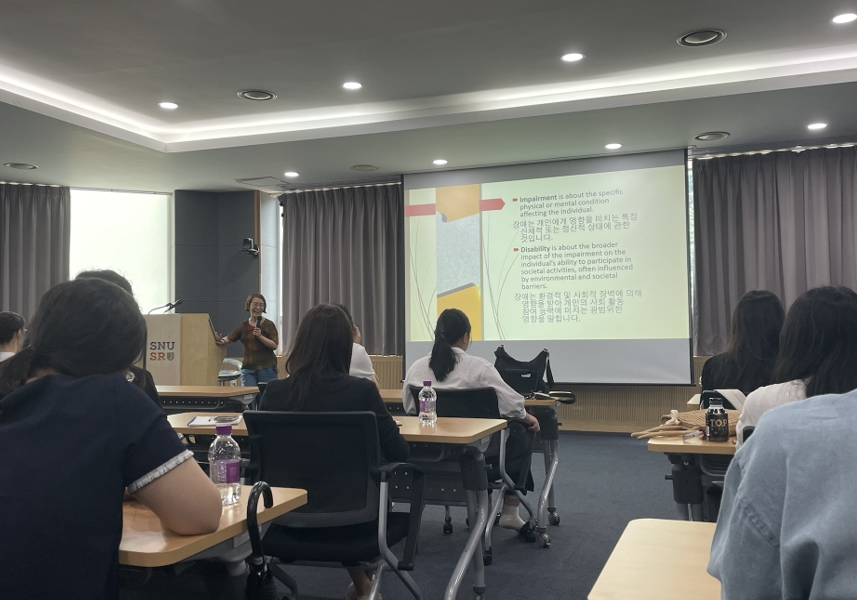On August 14, the SNU Center for Students with Disabilities (CSD) hosted a session featuring guest speaker Professor Lee Yoon-Joo. The CSD offers a variety of support services to assist the academic and campus life of students with disabilities, and regularly organizes programs to raise disability awareness among the university community. The event, titled “Life Goes On: My Continuous Journey of Living with Disability,” centered on Professor Lee’s personal and academic journey through her undergraduate and graduate studies, along with the insights she gained from her extensive work in Disability Studies. The session was moderated by Professor Park Hye Jun, Director of the CSD and a professor from the Department of Child Development and Family Studies at SNU. During the talk, Professor Lee reflected on her longstanding friendship and collaboration with Professor Park, highlighting their shared contributions to numerous dissertations, presentations, and conferences in the field of Disability Studies. The session was open to all, including disabled students, able-bodied students, and parents, allowing for a broad range of questions and interactions.

Professor Lee delivering her talk
One profound observation Professor Lee shared with us is that disability is a fact of the human experience, not the exception. Disability is not an ‘objective’ condition but something that exists in different social modes because it is so deeply affected by cultural, religious, and societal norms. She made a crucial distinction between “impairment” and “disability”; the former refers to the specific physical or mental condition that affects an individual while the latter pertains to the broader impact of this impairment on the person’s ability to participate in societal activities. For instance, Professor Lee shared that her experience of physical impairment varied depending on the environment. Navigating the streets of New York City was easier for her compared to Seoul, where she felt more restricted by the environment. This discussion led to her explanation of disability identity as a “cultural-developmental phenomenon,” where individuals integrate their disability into their self-definition, shaping their worldview.
Professor Lee’s latest pursuit is a book project where she explores different lived experiences of disability through interviews with Korean women. While sharing these anecdotes, she emphasized that there is no singular, universal experience of disability. Rather, disability is shaped by multiple intersecting factors that converge in distinctive ways for everyone. Moments of empowerment and marginalization thus arise from how these factors interact within specific contexts and how disability is perceived and treated by others in the environment. An intersectional view of disability is vital to genuinely understand the lives of disabled individuals. For instance, while aging is a universal experience that affects everyone, individuals with physical disabilities are likely to experience atypical aging at an accelerated rate. In one anecdote, Professor Lee shared how some disabled individuals need to get regular injections of Botox for muscle spasticity as they age but face find financial difficulty as it is not covered by insurance. Here, we see how a procedure that is generally viewed as a superficial means of supplementing beauty is a life-saving treatment for disabled individuals.
In the final moments of her talk, Professor Lee imparted these closing remarks: she strives to be aspirational but refuses to be inspirational. Often, the stories and lives of disabled people are consumed by able-bodied people as vehicles for inspiration. However, doing so overlooks their physical reality and reduces them to mere symbols of resilience. This approach recognizes disabled individuals as complex people with their own aspirations and challenges, rather than as inspirational figures who exist solely for others’ emotional upliftment. We encourage our readers to heed this wisdom—see disabled individuals for who they truly are, rather than as sources of inspiration.
Written by Hyun Kyung Jung, SNU English Editor, jhyunk@snu.ac.kr

